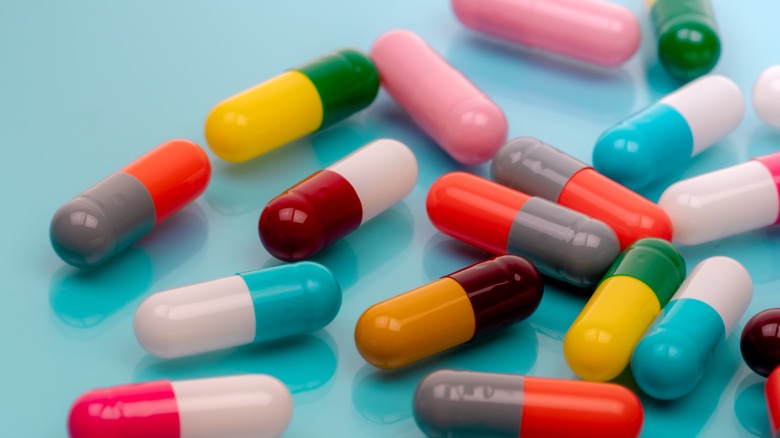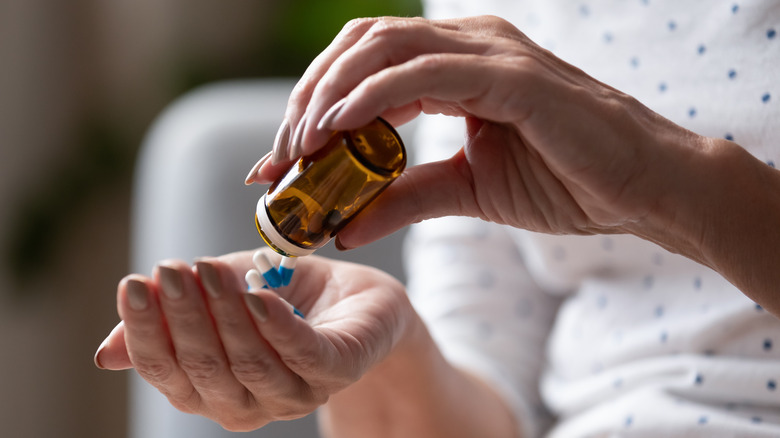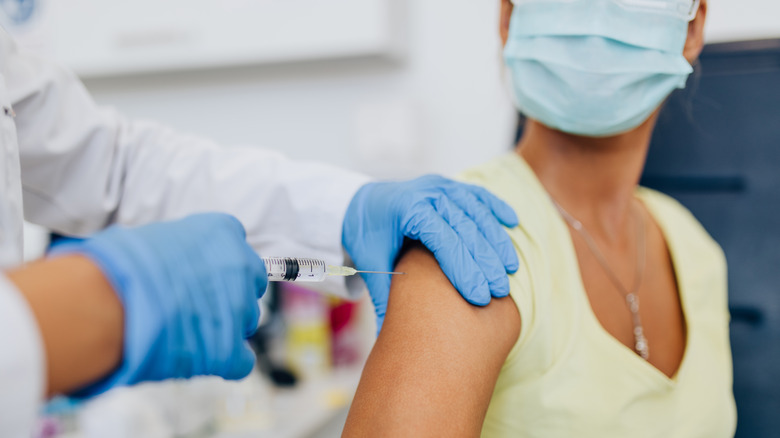This Is How Long It Takes For Antibiotics To Start Working
According to MedlinePlus, antibiotics, also known as antibacterials, are powerful medications that fight bacterial infections. The American Chemistry Society credits the discovery of penicillin, the first true antibiotic, to Alexander Flemming in 1928. Describing the health situation before Fleming's discovery, it states that hospitals used to be full of people dealing with blood poisoning from cuts and scratches because there was no effective treatment for infections. According to a 2018 report published by the Centers for Disease Control and Prevention (CDC), 270.2 million antibiotic prescriptions were written in the U.S. in 2016, which was enough to serve five out of every six Americans.
It's tempting to ask why the body needs antibiotics since the immune system is made up of various white blood cells, proteins, and organs that help to ward off diseases, per Johns Hopkins Medicine. Experts believe that the number of harmful bacteria can overwhelm the body, limiting the power to fight bacteria (via MedicalNewsToday). This is where antibiotics come in handy. However, to understand how long it takes for antibiotics to kick in, it's crucial to get a glimpse of how they work and what types of infections they can fight against.
A 2022 study published in the journal StatPearls outlines various types of antibiotics, including bactericidal (which kill bacteria) and bacteriostatic (which stop bacteria from multiplying). Even though antibiotics kill bacteria or prevent them from spreading, they don't work on viral infections like colds and the flu (via the NHS).
How long do antibiotics take to work?
Generally speaking, antibiotics begin working right after you take them, but in some cases, you might not feel better for two to three days (via Healthline). A huge part of how quickly you see results depends on the specific infection you're looking to treat. However, it's important not to judge the effectiveness of antibiotic treatment based on how you feel. Sometimes, it's tempting to think your antibiotics therapy is working, especially when you start feeling better. The World Health Organization emphasizes that feeling better or seeing an improvement in symptoms doesn't mean your infection is gone — people on antibiotics should only stop based on the recommendations of a health expert.
The CDC notes that taking antibiotics when they're not needed can cause numerous side effects. Therefore, it's crucial to only take antibiotics when (and how) your doctor prescribes them. Furthermore, treating viral infections with antibiotics may not always be effective. It can sometimes lead to antibiotic resistance, where bacteria don't respond to antibiotics and continue to cause infection, according to Johns Hopkins Medicine. In such situations, you can understand that waiting for antibiotics to kick in may be a lost cause.
What causes antibiotic resistance?
The Cleveland Clinic defines antibiotic resistance as a situation where antibiotic medicines can't kill or stop the growth of bacteria due to various biological changes in the bacteria itself. In the long run, it makes treating bacterial infections extremely difficult. The source outlines that many factors can contribute to antibiotic resistance, including overuse or misuse of antibiotics, which involves taking antibiotics when they're not needed, stopping therapy too soon, or using unprescribed antibiotics.
According to the American Society for Biochemistry and Molecular Biology, the antibiotic resistance crisis is happening worldwide, making bacterial infections a significant threat to human health. The Mayo Clinic deems antibiotic resistance as one of the world's most urgent health problems, revealing that it leads to nearly 35,000 deaths annually. Healthline supports this claim and reiterates that antibiotic resistance can lead to other serious infections, namely vancomycin-resistant enterococcus, methicillin-resistant Staphylococcus aureus, and carbapenem-resistant Enterobacteriaceae.
You can prevent antibiotic resistance by adhering to the prescriptions for antibiotics, vaccinating against diseases treated with antibiotics, and ensuring health caregivers adopt best hygiene practices when attending to you, per WebMD.



